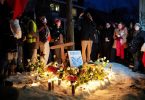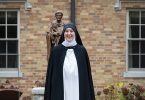
by Joe Bollig
joe.bollig@theleaven.org
KANSAS CITY, Kan. — Hearts are breaking in the Greater Kansas City area as bodies are bleeding in Myanmar, the country formerly known as Burma.
On Feb. 1, Myanmar’s military overthrew the democratically elected civilian government, declaring the November 2020 election null. The coup triggered widespread protest, to which the military has responded with brutal suppression.
Myanmar has been under military dictatorship for much of its history since it achieved its independence in 1948 from the United Kingdom.
“It broke my heart when I first heard this news,” said Alice Pyoe, a college student and member of Holy Family Church in Kansas City, Kansas. “I could not believe it was happening during the pandemic, and I was shocked.”
Pyoe was born in Thailand as a refugee, where her parents fled because of persecution by the military regime then ruling Myanmar.
“Our parents had to flee [Myanmar] because of many reasons,” said Pyoe. “They were uneducated; they did not have information access; they did not have sufficient communication systems, unity and good leadership.”

Pyoe, her parents and many others from Myanmar moved to the Greater Kansas City area under the U.N. refugee resettlement program. Many are Catholic, and some became members of Holy Family and St. Patrick parishes in the Archdiocese of Kansas City in Kansas.
Members of the metropolitan area’s Myanmar community participated in protests on Feb. 6, 13 and 20 against the military coup.
“I and my Burmese community have been peacefully protesting against the coup . . . to raise awareness of human rights in Myanmar and supporting the Civil Disobedience Movement,” said Pyoe.
Many people were surprised by the overthrow, said Simon Padue, a leader in the St. Patrick Parish Chin community. The Chin are an ethnic group from Myanmar.
“Every day, what can we do?” said Padue. “We just talk when we go to church and pray for our families and country. When we go to work, we meet each other and talk about the military coup happening right now.”

Communication has always been difficult between the United States and Myanmar, but it had improved in recent years with the help of technology. Since the coup, however, the military has restricted all means of communication — including that by cellphones and the internet — to short windows of time.
“From Feb. 1 until [Feb. 26], I talked to [my relatives] just two times,” said Padue. “I cannot catch them during the times they’re open.”
The protesters in Myanmar, and those in the Kansas City area as well, want four things, said Padue. They want an end to all forms of dictatorship; the abolition of the military-influenced 2008 constitution; the establishment of a federal democratic union; and the release of the unjustly detained civilian leaders.
Many Myanmar parishioners at Holy Family and St. Patrick are worried, said Father Michael Van Lian, a priest from Myanmar who ministers at the two parishes.
“Our people, my parishioners — they worry about their relatives and the future of my country because they were under military government for more than 50 years,” said Father Lian. “Most of the people experienced how hard life was when it was under the military.
“A lot of people ask me, ‘How can it be so? How can we help the country?’ I tell them we have to pray for them.”

Prayers for peace and justice in Myanmar have been offered at each Mass. There have also been rosaries, Holy Hours and eucharistic adoration. The Archdiocese of Kansas City in Kansas has asked all pastors to pray for a “swift, safe and peaceful return to the work of democracy” in Myanmar. Pastors have also been asked to include prayer petitions for Myanmar in the prayer of the faithful during Mass.
Father Lian has been trying to keep in contact with his bishop and family in Myanmar, but the military government shuts down the internet from 1 to 9 a.m.
“Their intention, in my opinion, is if they have the internet, people will contact each other through foreign countries,” said Father Lian.
Since the military government declared martial law, there has been a curfew from 8 p.m. to 4 a.m. This is when the military and police raid homes and arrest young people and civilian government members.
“If they have [connectivity], people will livestream when they are arrested,” said Father Lian. “[The military] worries about that.”
People in Myanmar cannot secure their homes with locks and video as in the United States, said Padue.
“Families wait all night and never sleep,” he said. “Most of us are poor, and our houses are not like here. [We have] nothing to lock the door. We try to use wood to block the doors. So, when the soldiers and police come to the house, they push down and open the door where they want to. They come in whenever they want. Some protesters are shot in the daytime.”
Padue hopes that other Catholics in the archdiocese will also pray for the people of Myanmar.
“Pray for us and help us,” he said. “Pray together in the name of the one body [of Christ]. This is our Catholic faith. We really need to pray for our people.”






